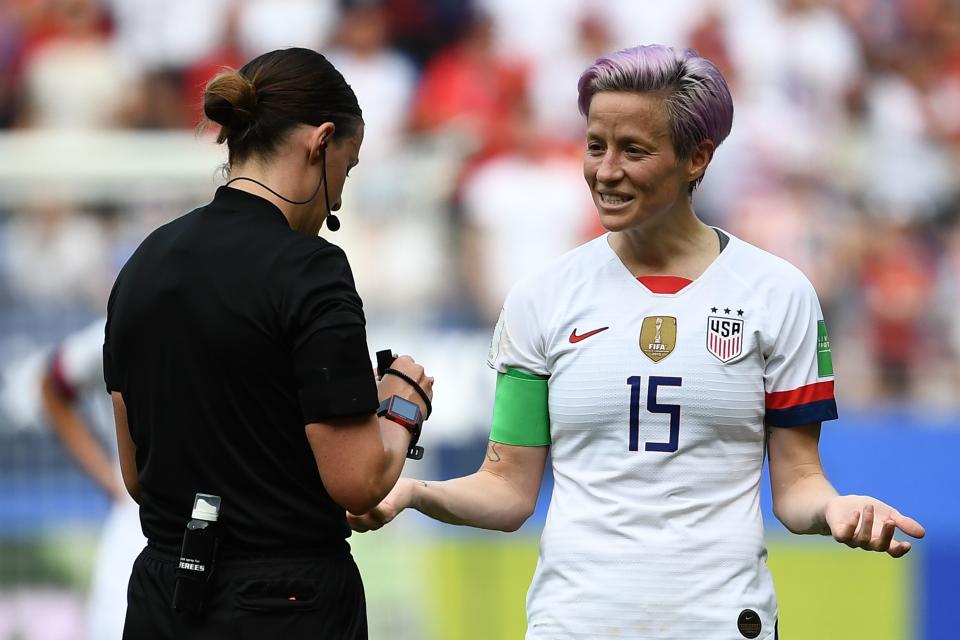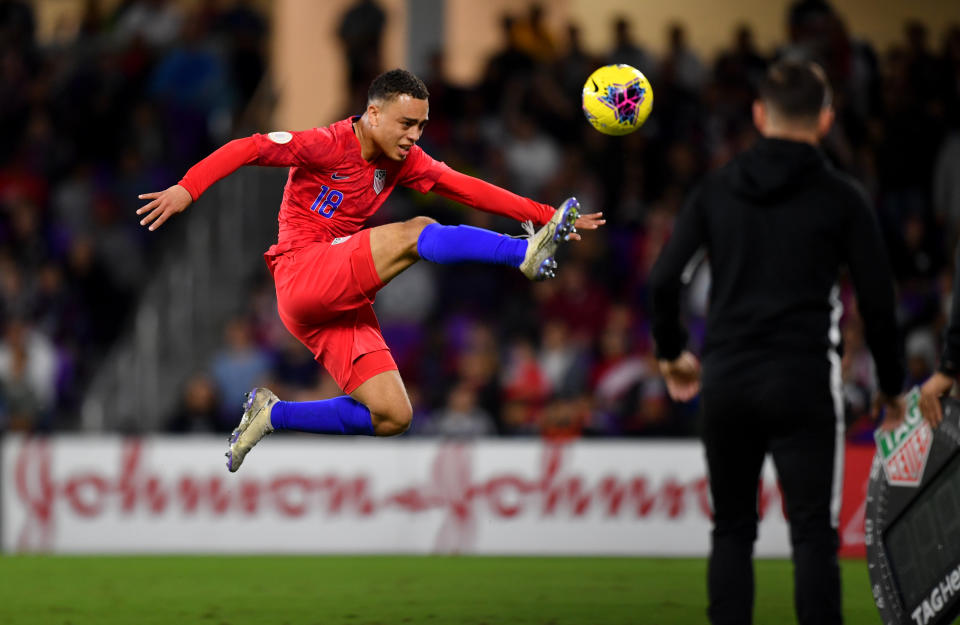If U.S. Soccer is OK with weaponizing misogyny, winning the equal pay lawsuit is irrelevant

Does U.S. Soccer really want to win this way?
As the federation defends itself against a wage discrimination lawsuit filed by the U.S. women’s national team, an unsavory argument has emerged: U.S. Soccer apparently thinks women’s soccer is inherently inferior, and therefore it justifies paying the USWNT less.
For a federation that says its job is to grow the game of soccer for everyone, and has patted itself on the back as a supporter of women, it’s quite the stance to take.
In court documents made public late Monday, U.S. Soccer argues that the USWNT has less “ability” than USMNT players because, essentially, they are women. “Ability,” as U.S. Soccer defines it, “is materially influenced by the level of certain physical attributes, such as speed and strength.”
It’s hardly breaking news that men and women are biologically different, and men tend to be faster and stronger. But for U.S. Soccer to use this fact to claim that the World Cup-winning players on the USWNT aren’t as skilled or as capable as the USMNT is a dismaying development.
It’s a legal argument tailored to the language of the Equal Pay Act, but if this belittling rhetoric helps U.S. Soccer fend off the USWNT’s effort to recoup $66 million in back pay, does U.S. Soccer really want to win? The federation will have prevailed by disparaging its most successful team and by outing itself as a misogynistic organization.
U.S. Soccer’s lead attorney, Brian Stolzenbach, writes that this argument is not “a sexist stereotype” – it’s just “indisputable science.” Try telling that to the players on the USWNT. Or any woman, for that matter.
As former USWNT star Heather O’Reilly put it: “FIFA prize money calculations can and will be debated. Commercial revenue and income can and will be debated. TV ratings and sponsorship can and will be debated. But to read that U.S. Soccer thinks this of the USWNT and female athletes in general is disgusting and disturbing to me.”
Even the American Outlaws, the official supporters group of the U.S. national teams, issued a statement Tuesday calling U.S. Soccer’s viewpoint “objectionable.”
“That is not how the sport should be run in this country, or any country,” said the statement, for which Megan Rapinoe thanked the Outlaws. “We believe equality should be guaranteed in all spaces and the organization charged with administering the sport in this country should be pursuing the same.”

Sources have previously told Yahoo that the relationship between the players and U.S. Soccer has deteriorated since the lawsuit was filed one year ago, but now it’s a genuine concern that the relationship will be beyond repair once this ordeal is over. A trial date is set for May 5, and if the rhetoric has turned this ugly already, the worst is yet to come.
On Tuesday, a source said, reaction to U.S. Soccer's sexist arguments reverberated around camp as the USWNT prepares to face Japan at the SheBelieves Cup, with some players befuddled the federation thought it was a good approach to take.
U.S. Soccer’s other latest arguments aren’t any less belittling. The federation lists some examples of institutionalized sexism, such as FIFA’s unjustifiable disparity in prize money for women vs. men, and then concludes that this means “the job of MNT player carries more responsibility.”
This is tone deaf, given the relative lack of investment the USWNT has had to face and the extra work the players have had to do to carve out a place in the sports landscape.
The fact is, the USWNT plays generally more games in a calendar year, does far more media on behalf of U.S. Soccer and faces much greater pressure to win. The USMNT players, meanwhile, treat their clubs like their full-time jobs and the national team like a small side gig.
The federation goes on to argue that the USMNT’s lack of popularity means their job is more demanding than the USWNT job. In the latest court filing, U.S. Soccer argued: “Even the hostility of fans at home crowds for the MNT in some friendlies can be unlike anything the WNT faces.”
Would U.S. Soccer prefer the American public be is as apathetic toward the USWNT as it is toward the USMNT?
U.S. Soccer’s efforts to contort various arguments to settle on the notion that men’s soccer is inherently more important did not sit well with Molly Levinson, a spokeswoman for the USWNT in the lawsuit.
“This ridiculous ‘argument’ belongs in the Paleolithic Era. It sounds as if it has been made by a caveman,” Levinson said in a statement. “Literally everyone in the world understands that an argument that male players ‘have more responsibility’ is just plain simple sexism and illustrates the very gender discrimination that caused us to file this lawsuit to begin with. So looking forward to trial on May 5.”
Asked to comment on the reaction that U.S. Soccer’s defense is sexist, spokesman Neil Buethe turned the discussion back to reaching a settlement.
“We are fully committed to finding a successful outcome, and that starts with meeting face-to-face without preconditions,” he said in a statement. “We listened to what they wanted, and have offered identical compensation to our MNT and WNT for all matches controlled by U.S. Soccer, and that remains on the table. We hope the players and representatives of the WNT will drop their requirement that they will only sit down to talk if US Soccer agrees to pay the $34 million World Cup prize difference that everyone knows and understands is the direct responsibility of FIFA. If they are willing to accept our offer to meet, we would look forward to having a productive dialogue.”
But given the public reaction to U.S. Soccer’s latest approach, it’s worth wondering what the reaction will be like inside U.S. Soccer House.
Who wins or loses the lawsuit almost seems beside the point now. U.S. Soccer has argued in a public document that it believes its female players are inferior and now the federation has to answer to its staff, board members and players.
This comes at a time when the federation has been battling low morale and high turnover. Who wants to be affiliated with what now seems like a sexist organization?
Sure, there is a path toward equal pay that could work if all parties sit down and hash it out. But any sort of compromise is impossible if the USWNT doesn’t feel their employer respects them.
U.S. Soccer may have ruined any hopes of a settlement with its disparaging rhetoric – and it may have tarnished its reputation too, regardless of who wins the lawsuit.
Caitlin Murray is a contributor to Yahoo Sports and her book about the U.S. women’s national team, The National Team: The Inside Story of the Women Who Changed Soccer, is out now. Follow her on Twitter @caitlinmurr.
More from Yahoo Sports:

 Yahoo Finance
Yahoo Finance 